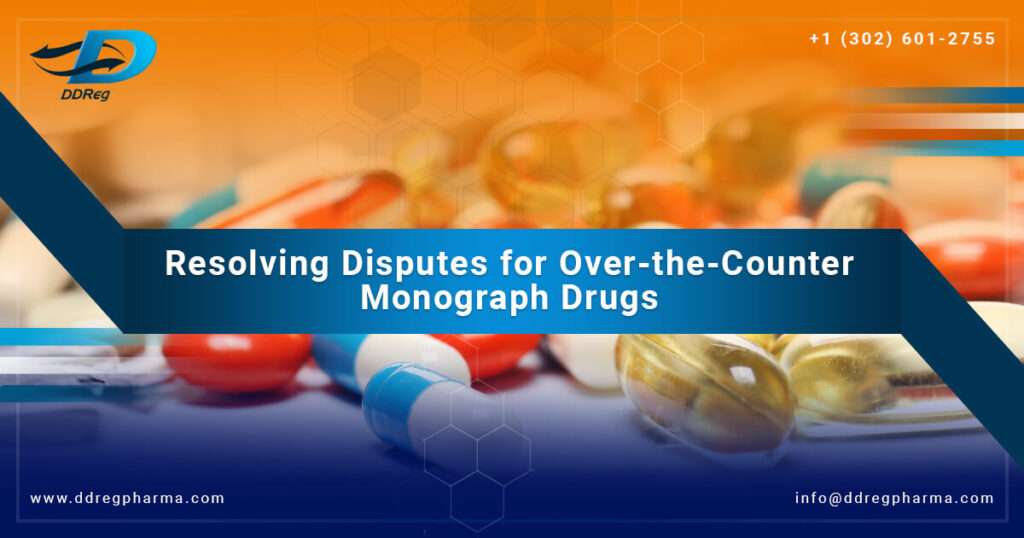Over-The-Counter (OTC) monographs define the safety, effectiveness, and labelling of the active ingredients in OTCs. The US FDA released a guidance document that provides suggestions for industry and review staff on resolving scientific and medical disputes related to OTC monograph drugs. It describes the Center for Drug Evaluation and Research (CDER) formal dispute resolution (FDR) procedures for requestors or sponsors that want to appeal a scientific and/or medical issue associated with a final order. Let’s delve into the key aspects outlined in this guidance and how they impact OTC drug regulations.
Understanding OTC Monograph Drugs
If OTC monograph drugs satisfy the criteria specified in section 505G of the Food, Drug, and Cosmetic Act (FD&C Act) as well as other relevant regulations, they can be marketed without needing a new drug application. These drugs serve as accessible options for consumers to address various health concerns, and their regulation requires adherence to specific standards to ensure their safety and effectiveness.
Formal Dispute Resolution (FDR) Procedures
The FDA’s guidance provides a framework for resolving disputes between the CDER and requestors or sponsors of OTC monograph drugs. The document outlines the FDR procedures for eligible parties who wish to appeal scientific and medical issues pertaining to a final administrative order which include requestors and sponsors of OTC monograph drugs.
According to the FDA, a FDR pursuant to 505G(b)(2)(A)(iv)(III) is appropriate for scientifici and/or medical disputes related to a determination in a final order whether there are conditions under which a specific drug, a class of drugs, or a combination of drugs are determined to be the following:
- Not subject to section 503(b)(1) which requires certain drugs to be dispensed by prescription only, and
- Generally recognized as safe and effective
Timelines
An eligible requestor must submit the FDR request within 45 calendar days of the final order being issued.
For subsequent levels of appeal, the FDR request must be submitted within 30 calendar days of the prior decision.
The FDA must complete any hearings for the final order that is issues in an expedited procedure no later than 12 months of the date of the final order issue.
Request for FDR: Content and Format
An FDR request should consist of information that explains the nature of the scientific and/or medical dispute which would then allow the officials to determine the next steps to resolve the matter. Requests should include the following:
- Identification of the submission as FORMAL DISPUTE RESOLUTION REQUEST
- Order identification (ID) number
- OTC monograph ID number & OTC monograph title (if applicable)
- Determination(s) in the final order that are subject(s) of dispute, including the identification of specific OTC monograph provisions implicated (if any)
- Statement of each issue to be resolved including:
- Description of the dispute to be resolved
- Summary of relevant regulatory history (including prior stage of FDR for the dispute if applicable)
- Statement of eligible requestor’s or sponsor’s proposed possible solutions and/or outcomes
- Statement that identifies division and/or office that issued the final order & the deciding official on prior stage of FDA if applicable
- List of documents previously submitted
- Statement that no new information has been submitted
- Name, title, contact information of the eligible requestor or sponsor submitting the FDR
Administrative Hearings and Compilation of Proceedings
In addition to FDR, the provided guidance also covers administrative hearing procedures. Should an eligible requestor or sponsor find CDER’s decision unsatisfactory even after participating in FDR up to the Director level, they retain the right to request a hearing. Furthermore, if multiple FDR requests or hearing requests are made regarding the same final order, the FDA has the sovereignty to consolidate the proceedings to streamline the resolution process.
Regulatory Framework and User Fees
The regulatory landscape for OTC monograph drugs was significantly impacted by the Coronavirus Aid, Relief, and Economic Security Act (CARES Act) signed into law in March 2020. This Act introduced section 505G to the FD&C Act, reforming and modernizing the OTC monograph drugs regulations. It also authorized the FDA to collect user fees dedicated to OTC monograph drug activities. This framework provides a comprehensive approach to ensure the safety and efficacy of OTC drugs while streamlining regulatory processes.
Conclusion
The FDA’s guidance on resolving disputes for OTC monograph drugs offers valuable insights into the processes and procedures for addressing scientific and medical concerns related to these medications. By establishing formal dispute resolution mechanisms, including FDR, administrative hearings, and consolidated proceedings, the FDA aims to ensure a fair and efficient resolution process. The guidance aligns with the regulatory framework introduced by the CARES Act, emphasizing the importance of safety and efficacy in the marketing of OTC monograph drugs. Industry stakeholders and review staff are encouraged to familiarize themselves with this guidance to navigate the resolution of scientific and medical disputes effectively.
References and Further Reading
FDA. Formal Dispute Resolution and Administrative Hearings of Final Administrative Orders under Section 505G of the Food, Drug, and Cosmetic Act. United States Food and Drug Administration. 2023

